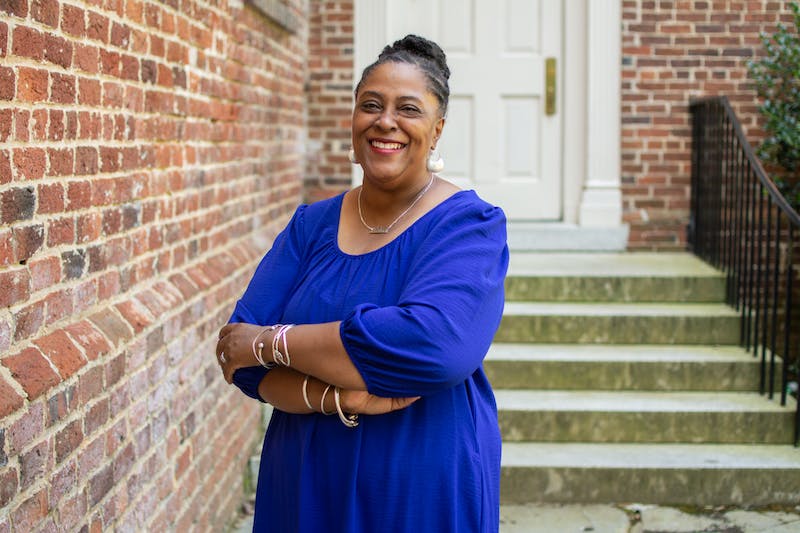
Danita Mason-Hogans was desperate for change.
A seventh-generation Chapel Hill native on both sides of her family, whose father was one of the Chapel Hill Nine, Mason-Hogans became a historian because she experienced the negative consequences that desegregation had on the Black community in CHCCS, including educational staff loss and a lack of accountability.
In 2019, she won the Chamber for a Greater Chapel Hill-Carrboro’s Big Bold Ideas competition— her idea was an educational program for students who were descendants of enslaved people to help close the Chapel Hill-Carrboro City Schools’ achievement gap between white and Black students.
“I’m thinking, finally, we’ll have an education program to deal with this achievement gap that’s been here for the folks who essentially built this town,” Mason-Hogans said.
But, when the Chamber published her idea on its website, she said the information didn’t reflect what she proposed. It didn’t mention participating students would be descendants of enslaved people, although the basis of her idea was that educational disparities reach all the way back to enslavement.
She had previously had multiple projects within CHCCS, like a museum and community room to honor the descendants of enslaved people and their contributions to the district. None of her other efforts were adopted.
And so, in her desperation, Mason-Hogans started forming the board for what would become Bridging the Gap, a nonprofit focused on providing educational opportunities for descendants of enslaved people.
Porch Sisters
Missy Julian-Fox, a lifelong Chapel Hill resident and a member of the family that owns Julian’s fashion store on Franklin Street, met Mason-Hogans at the Big Bold Idea showcase.
Julian-Fox’s first career path out of college was as an elementary school reading specialist. To her, education and reading have always been the first step to access.
“To meet Danita and some of her colleagues and friends, and for her to share this idea, for me it was like, ‘My God, that’s the bingo,'” she said.
After a breakfast meeting, Julian-Fox scheduled a sit-down on her porch. Mason-Hogans brought one more new friend, Sandra Wilcox Conway — a consultant and activist.
“Fast forward, and the three of us have been meeting for over three years, every Tuesday,” Julian-Fox said. “One day, about a year in, one Tuesday, Danita walked in and she said, ‘Oh my gosh, I love my porch sisters.'”
Mason-Hogans said having both generational Black Chapel Hill women — like herself — and generational white women — like Conway and Julian-Fox — talking about equity issues and advocacy is special.
One day on the porch, Mason-Hogans asked Julian-Fox to be on the board of Bridging the Gap — an experience Julian-Fox said has been a learning experience in itself. The board is made up mainly of educators with about 150 years of combined experience.
“I’m surrounded by long-time, extraordinary Black educators from their very soul,” Julian-Fox said. “And they are the truth tellers. They have been at this — they have been up against this — for a very, very long time.”
Achievement gap and the James Cates Scholars
According to a 2018 Stanford study, Chapel Hill-Carrboro City Schools has the second-largest achievement gap between Black and white students in the country.
“I think that people broadly — because Chapel Hill is such a transient community — did not understand that history is present because these issues have never been dealt with from the enslavement, from Jim Crow, to today,” she said. “And that history is very present in the performance of the children in Chapel Hill-Carrboro City Schools.”
Bridging the Gap’s flagship project is the annual James Cates Scholars program — a paid summer internship for high school students to learn local Black history and work on summer history projects.
The program started in 2019 when Mason-Hogans learned about students in a local high school producing a podcast where they asked other students what they thought about CHCCS’ achievement gap. She called the students to ask how she could help.
She ended up connecting the students with recording equipment and resources at the Chapel Hill Public Library.
Those students were the first James Cates Scholars.
This summer’s James Cates Scholars presented their work at the Chapel Hill Public Library on Aug. 7, with dozens of community members in attendance. One of this year’s scholars was Nevaeh Hodge, whose summer project was focused on her ancestry — Hodge is a descendant of Carrboro’s first Black family, the Strayhorns, and she produced a documentary on their family house, built just after the Civil War.
“Before, I didn’t know a lot about the house, and I never really asked,” she said. “But through the James Cates Scholars, I got to learn more about my family history and really digging deep to that history.”
Mason-Hogans said that summer projects are important, but without extra help during the school year students of color can fall behind. To address that, she wants Bridging the Gap to start an after-school program.
“Danita and Bridging the Gap offers us — all of us in the community, in the larger world — offers us an opportunity to change for the better the way our children learn, our school system works,” Julian-Fox said.
@DTHCityState | city@dailytarheel.com
Ethan E. Horton is the 2023-24 city & state editor at The Daily Tar Heel. He has previously served as a city & state assistant editor and as the 2023 summer managing editor. Ethan is a senior pursuing a double major in journalism and media and political science, with a minor in history.
To get the day’s news and headlines in your inbox each morning, sign up for our email newsletters.







